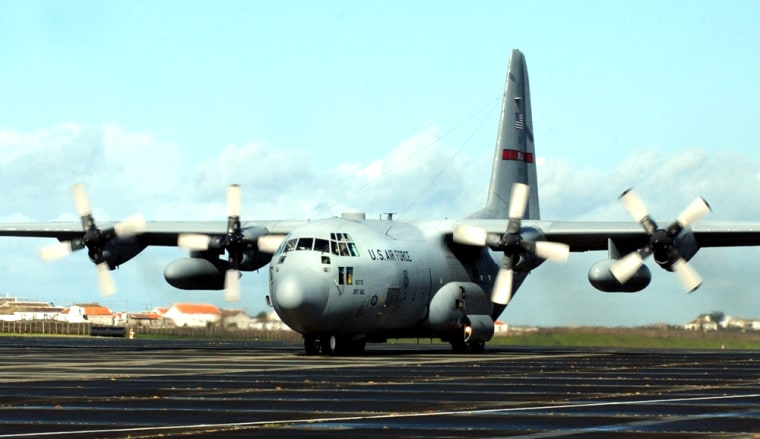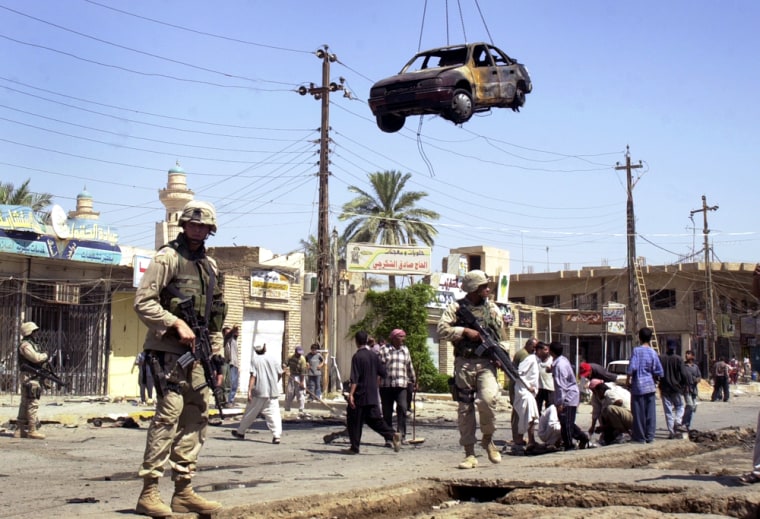The United States will transfer legal custody of Saddam Hussein to the new Iraqi government perhaps as early as next weekend, Prime Minister Iyad Allawi said on Sunday, a day in which violence and kidnapping persisted just 72 hours before the transfer of sovereignty to a new Iraqi administration.
Security measures have been increased around government buildings, power stations and oil installations, an official in the Iraqi Interior Ministry said Sunday.
Insurgents also targeted security forces and a pro-American political party in a spate of attacks in Iraq’s north which killed at least two Iraqis. The attacks came a day after a pair of car bombs hit the southern city of Hillah, killing about 20 people.
The Interior Ministry official, who spoke to The Associated Press on condition of anonymity, refused to give details about which sites had added security measures.
‘Very soon’
The ousted Iraqi leader will remain in the hands of U.S. troops, U.S. officials say.
Allawi said legal documents are being drafted by both the coalition and his new ministry for Iraq to take custody of Saddam and other Iraqi prisoners captured during the war.
The transfer of the prisoners should occur shortly after Wednesday’s handover of sovereignty, he said on CNN’s “Late Edition.”
“Very soon,” Allawi said. “I can tell you probably now it will be either hopefully second or third of July.
“I was just briefed by the minister of justice and legal advisers that all the documents are being done with the coalition and with the multinational force and we hope 2, 3 or Fourth of July, Saddam would be in the custody of the Iraqi people, of the Iraqi government,” Allawi said.
U.S. forces will honor transfer-of-custody requests from Iraq’s incoming government, which takes power June 30, as long as they are accompanied by arrest warrants from an Iraqi court, the official said.
The Iraqi Special Tribunal, established six months ago, is expected to try Saddam for atrocities committed during his 23 years as president, including the deaths of some 300,000 people.
Also Sunday, Turkey rejected demands of Islamic militants who are threatening to behead three of its kidnapped citizens during President Bush's visit to Turkey. And Arab television broadcast a videotape Sunday showing a man in military uniform it said was a U.S. Marine taken hostage in Iraq.
Earlier, Arab TV reported that a Pakistani had been abducted and threatened with the same fate unless the United States releases some prisoners in its custody.
Attacks continue
Violence remained a constant throughout the weekend. A U.S. soldier was killed Sunday in a rocket attack on the outskirts of Baghdad, the U.S. military said.
The attack occurred at Camp Cuervo, a 1st Cavalry Division camp, military officials said. No further details were released.
Earlier Sunday, insurgents hit a U.S. military transport plane with gunfire after it took off, killing one person.
The C-130 aircraft had just departed Baghdad International Airport when it was hit by small arms fire. It returned to the airport and landed safely, but one person wounded in the shooting died, said U.S. Lt. Col. Mark Kimmitt.
Aircraft have been hit several times flying in and out of the heavily guarded airport, but Sunday’s incident was the first reported death.
Mosul, Baghdad, Fallujah targeted Elsewhere, three mortar shells exploded Sunday at the Mosul office of the Patriotic Union of Kurdistan, a pro-U.S. political party. Four party members were wounded, a PUK official said. A Mosul policeman was killed in a drive-by shooting in another incident, police said.

Explosions on Sunday morning rocked central Baghdad as guerrillas fired a volley of rockets that hit in the Green Zone, the neighborhood used as the headquarters of the U.S. occupation. No injuries were reported. More explosions were heard Sunday evening, but there was no immediate word on their cause.
Explosions were also heard early Sunday on the northern outskirts of the troubled city of Fallujah, west of the capital. Residents said a U.S. Marine position was attacked by mortars and rocket-propelled grenades, but there was no confirmation from U.S. officials.
The military said a pair of car bombs may have caused the explosion late Saturday in downtown Hillah, a largely Shiite Muslim city south of Baghdad. Iraqi police and Hillah-area hospitals reported 23 people were killed and 58 wounded. The U.S. military reported a death toll in line with the Iraqi count.
In Baqouba, gunmen on Saturday attacked the offices of Allawi’s political party and those of another, Shiite party. Three civilians and six insurgents were killed in fighting in the city.
The increase in violence continued apace from Thursday, when fighters loyal to Abu Musab al-Zarqawi launched a wave of coordinated attacks in five cities in Iraq, battling with U.S. troops who eventually regained control but only after some 100 people, including three Americans were killed. Al-Zarqawi is a Jordanian-born terrorist believed to have ties to al-Qaida.
Bush in Turkey
The bloodshed and the abductions threatened to cast a shadow over a NATO summit opening in Istanbul on Monday, where Bush is seeking the alliance’s help in stabilizing Iraq.
Bush met with Turkish leaders in Ankara on Sunday ahead of a NATO summit starting the next day. More than 40,000 demonstrators, some chanting “USA, get out of the Middle East!,” gathered in Istanbul to protest his visit. Bush's policies in Iraq have been extremely unpopular among Turks.
Bush said he hoped the 26-member NATO alliance, which is grounded in Cold War geopolitics, can adjust its mission to meet modern-day threats.
“We’re going to work together to help make sure NATO is configured militarily to meet the threats of the 21st century,” Bush said.
Rumsfeld: More troops not needed
Defense Secretary Donald H. Rumsfeld said the United States was not planning any immediate increase in troops to deal with the insurgency as a new Iraqi government takes power this week. He noted that the number of troops had already increased over the past three to four months from 113,000 to 141,000.
“We don’t want to be an occupying power,” he told the British Broadcasting Corp. “Breakfast with Frost” program from Istanbul. “The Iraqi people are going to have to provide for the security of their country and they are well on the way to doing it.
Iraq’s interim prime minister, Iyad Allawi, said his government wanted to try to split the insurgency by separating less ideological members from the hardcore leaders.
“We are drawing up plans to provide amnesty to Iraqis who supported the so-called resistance without committing crimes, while isolating the hardcore elements of terrorists and criminals and undercutting their base of support,” Allawi wrote in an opinion article published Sunday in Britain’s The Observer newspaper.
On Saturday Allawi said violence could force the delay of national elections, a key part of U.S. efforts to bring democracy to Iraq, scheduled to take place by Jan. 31 under Iraq’s interim constitution. He also said his government was drawing up a law to give security forces more power to make arrests and impose curfews.
